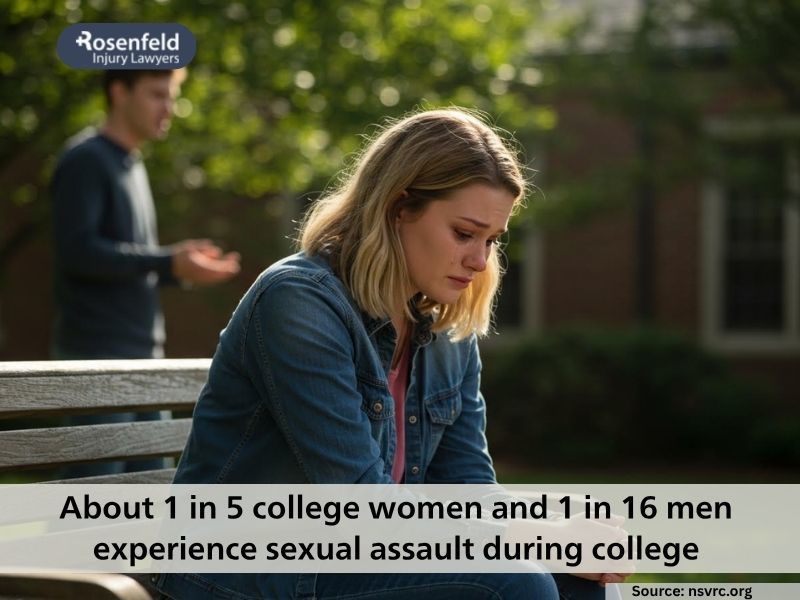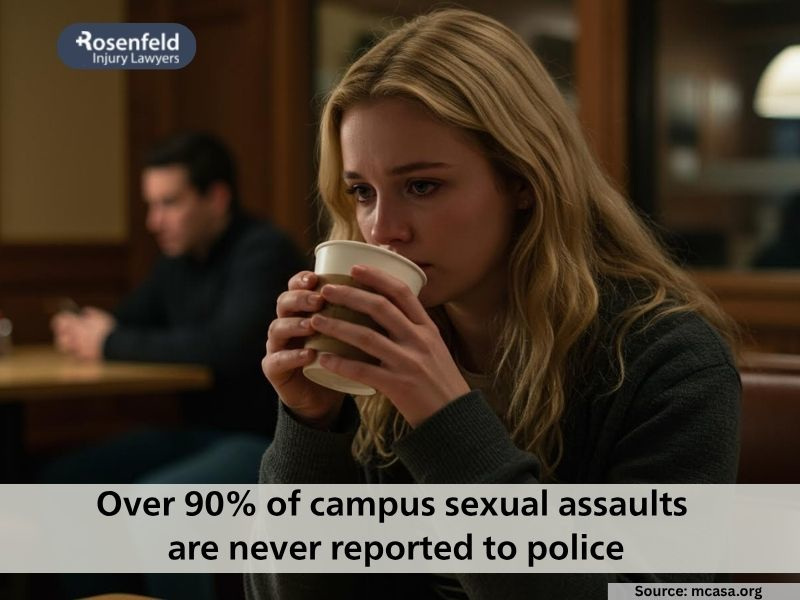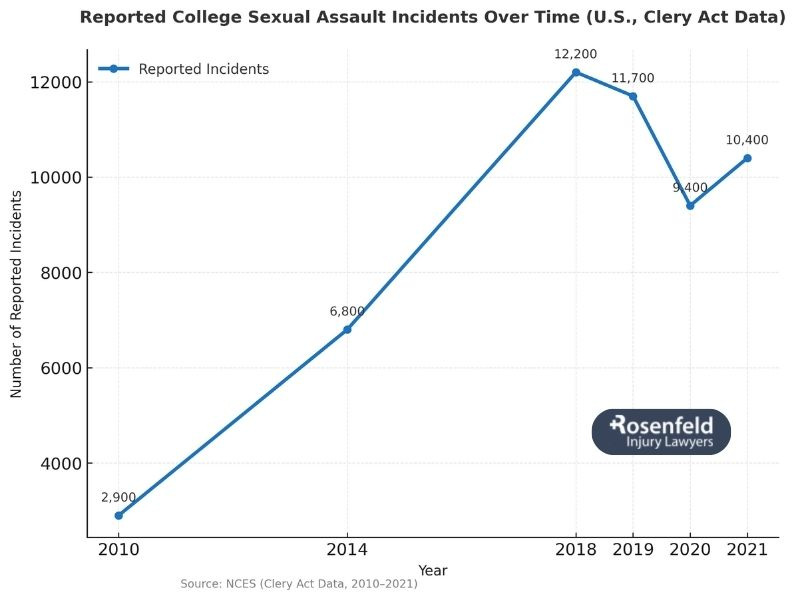College Sexual Assault Lawsuits

Experienced College Sexual Assault Lawyer
Dozens of college sexual assault lawsuits have alleged that higher education has failed to protect students from campus sexual violence. Injury Lawyer Team is here to support survivors and push for more accountability at colleges and universities through civil lawsuits. Contact us today for a free, confidential, and no-obligation consultation about your legal rights.
College Campus Sexual Assault Lawsuits and Allegations That Made National Headlines
Multiple colleges and universities have been the target of sexual abuse lawsuits for refusing to investigate claims of campus sexual assault or even protecting abusers from consequences for their misconduct. These legal claims highlight the hostile environment that many students must face, putting their mental health and future careers on the line.
Michigan State University
The Michigan State University sexual abuse lawsuits were one of the most extensive in the nation, highlighting how a sexual predator was able to use the campus as a hunting ground for decades. These gymnastics team sexual abuse lawsuits centered around Larry Nassar, an associate professor and doctor who sexually abused at least 332 women and girls.
Michigan State University settled with the survivors for $500 million in October 2018. An additional $75 million was set aside for future claims.
Penn State
The Penn State scandal resulted in some of the largest sexual abuse lawsuits in Pennsylvania within recent memory. Twenty-six men filed claims against the university, alleging that former assistant football coach Jerry Sandusky sexually abused them.
According to reports, university officials failed to inform local law enforcement of the sexual misconduct, preferring to protect Sandusky’s reputation rather than the victims. According to a grand jury report, not only did Sandusky abuse men at Penn State, but he also molested young boys through his Second Mile organization, which was meant to support at-risk youth. He was found guilty of sexual abuse in 2012.
In 2013, Penn State settled with the survivors for $59.7 million. The university has paid over $113 million in settlements to these victims alone.
University of Michigan
The Dr. Robert Anderson sexual abuse lawsuit involved over 1,000 survivors, many of whom were male athletes. Anderson worked for the university for almost 40 years, during which time he sexually abused students during routine medical examinations. Some students were forced to have genital exams despite coming in for cold sores.
Anderson died in 2008, but plaintiffs in these sexual abuse lawsuits allege that university officials were well aware of what was happening but refused to conduct investigations or remove his privileges. University of Michigan settled with the survivors in 2022, distributing $490 million among the 1,050 plaintiffs. Another $30 million is set aside for future sexual abuse claims.
College Campus Sexual Assault Statistics
Campus sexual assault (CSA) comprises approximately 43% of all crimes on college campuses, and up to 25% of all female students state that they have been victims of sexual harassment, assault, or abuse during their education.
Of this sexual misconduct, 82% happens on campus. A survey found that 13% of respondents had been forced to perform unwanted sexual acts.
However, it is not only women who are abused. 40% of all students, both men and women, are harassed at least once during their college career. Undergraduates of all genders are more likely to experience sexual abuse than their older graduate or doctoral peers.
Sadly, only a third of female sexual abuse survivors seek help from programs or other resources meant to help them, and only 17.8% of men file complaints or access resources.

Who Can Be Held Accountable for Sexual Abuse at Colleges and Universities?
Potentially liable parties for college and university sexual abuse lawsuits include the following.
- Individual Perpetrator: The sexual abuser is typically the first individual in a lawsuit.
- Residence Halls: Dorm supervisors, security officers, and property managers are obligated to protect students and report any incidents to the authorities.
- Campus Safety Departments: These departments should swiftly intervene in instances of sexual abuse or unwanted attention, such as stalking and harassment. If they fail to investigate incidents, they may be liable in sexual abuse lawsuits.
- Colleges and Universities: The college or university itself can be held liable for negligent hiring, training, or supervision, particularly if officials were made aware of the sexual abuse but did nothing to stop it.
What Are the Bases of Liability in College Sexual Abuse Lawsuits?
Colleges and universities are obligated to ensure all students are safe and free from sexual abuse. However, many fail to uphold this responsibility, leading to lifelong trauma for victims. Schools can be liable if they:
- Ignore or dismiss sexual abuse complaints
- Do not take reasonable steps to protect fellow students, such as by removing a perpetrator from campus
- Fail to provide reasonable security measures like access control, locks on dorm doors, or security patrols at high-risk locations
- Retaliate against sexually abused students
The US Supreme Court ruled in Gebser v. Lago Vista that school districts and other institutions can be liable in a sexual abuse lawsuit if they were aware that the abuse occurred but did not stop it.
What Legal Options Do College Sexual Abuse Victims Have Under State and Federal Law?
Students can pursue several legal processes after campus sexual abuse. The first is to file a civil lawsuit, which allows them to pursue financial compensation from individual perpetrators, other liable parties, and their university. Survivors can bring suits for:
- Intentional torts, including intentional infliction of emotional distress
- Negligent hiring or retention
- Negligent infliction of emotional distress
- Vicarious liability
- Premises liability
- Failure to warn
- Failure to supervise, train, or oversee
- Civil rights violations under Title IX
Other options can include:
- Submitting a report under the Clery Act, which requires colleges and universities to report campus crime data(Section 485(f))
- Filing a Title IX complaint (Title 20 U.S.C. Sections 1681-1688) with the US Department of Education’s Office of Civil Rights (OCR)
- File a complaint with the Department of Health and Human Services Office for Civil Rights
- Report the sexual assault to local law enforcement for criminal prosecution
How Long Do Student Victims Have to Take Legal Action?
The civil statute of limitations on sexual assault varies widely by state, meaning that you need to work with a lawyer experienced in your state’s laws to ensure that you file claims within the deadline.
State discovery rules allow for extended times if you did not immediately realize that you were sexually abused, such as if you were unconscious when the abuse occurred.
What Damages Can Sexually Assaulted Students Recover?
Damages you may be able to recover in sexual abuse lawsuits include:
- Medical bills
- Lost wages
- Loss of future income
- Mental health treatment
- Physical pain and suffering
- Emotional distress
- Loss of normal life
There may be additional damages possible, such as compensating a survivor for their educational costs if they had to leave school.
How Injury Lawyer Team Can Help
We can help you file claims against:
- Fordham University
- Indiana University
- Rockefeller University
- Villanova University
Our team of Super Lawyers will thoroughly investigate your claim to uncover vital information, such as medical records, incident reports, and student enrollment records. We’ll also review the institution’s sexual misconduct policies to demonstrate that they failed to implement their own procedures for investigating sexual abuse.
Through this investigation, we can establish liability before moving to negotiation. As Million Dollar Advocates, we have a peerless track record of securing high settlements for our clients, having recovered over $450 million across the last two decades.
Many cases settle during negotiation or mediation, which spares the survivor from having to go to trial. However, if the defendants refuse to negotiate, we can file complaints with the appropriate court and represent you before a jury. Throughout the process, we will shield your privacy, protect you from the perpetrator, and ensure you feel confident in your decision to pursue justice.
College Campus Sexual Assault Resources
If you suffered sexual abuse during your education, you’re not alone. Both state and national organizations are here to assist you in your healing journey, including the following.
- RAINN: The Rape, Abuse, and Incest National Network maintains a clearinghouse of local organizations. You can call the 24/7 National Sexual Assault Hotline at 800.656.HOPE for immediate help.
- National Sexual Violence Resource Center (NSVRC): This resource center offers trauma resources and assists survivors in finding local support.
- End Rape on Campus: One of the leading legal support agencies, this organization advocates for ending campus sexual assault and empowering survivors.
- Clery Center: The Clery Center provides information on how to file a Clery Act claim against educational institutions.
- Campus Counseling Centers: Most universities have a counseling center where professionals are trained to offer support to survivors of sexual violence.
- Title IX Coordinators: Your college’s Title IX coordinator will help you file a Title IX complaint and secure accommodations to help you finish school.

FAQs
What constitutes sexual abuse and assault?
According to the National Sexual Violence Resource Center, sexual abuse occurs when a person forces another person to engage in sexual acts by placing them in fear, or engages in sexual activity with a person who cannot consent. For example, someone threatening their partner with violence or saying they will leave if they don’t have sex would be abusing them.
Sexual assault is any nonconsensual sexual activity where the person lacks the ability to consent, as defined by any local, state, or federal law. On campus, this often involves encouraging the person to drink to excess or slipping them date rape drugs.
What is Title IX?
Federal statutes prohibit sex-based discrimination in any educational institution that receives federal funding, including colleges and universities (Title 20 U.S.C. Sections 1681-1688). Due to the gender-based nature of sexual abuse, it is also considered discrimination.
This law mandates that educational institutions have procedures in place to prevent abuse, report incidents, and support survivors so that they can remain in school. It also requires these institutions to have a person who can coordinate claims and oversee training activities.
What factors impact civil claim values?
Factors that influence how much you may receive can include:
- Available evidence
- Liability of institutions and organizations
- Severity and duration of the sexual abuse
- Overall economic and non-economic damages, like medical bills
- Length of recovery, including time away from work or education
- Witness testimony
- Available insurance policies
If your case goes to trial, the jury may award punitive damages, meant to punish the perpetrator and force procedural changes. This can significantly impact the value of your claim. Additionally, whether the case settles out of court or goes to trial can change the amount you receive, as some states have statutory caps on damages.
Book a Free Consultation
Our team fights hard to secure fair financial compensation for survivors of college sexual abuse. We work on a contingency fee basis: no fees unless we win. Contact us today for a free, confidential, and no-obligation with a caring and experienced attorney.
All content undergoes thorough legal review by experienced attorneys, including Jonathan Rosenfeld. With 25 years of experience in personal injury law and over 100 years of combined legal expertise within our team, we ensure that every article is legally accurate, compliant, and reflects current legal standards.








